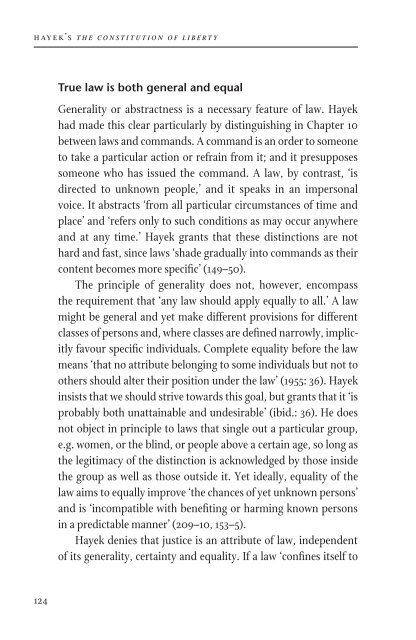Hayek's The Constitution of Liberty - Institute of Economic Affairs
Hayek's The Constitution of Liberty - Institute of Economic Affairs
Hayek's The Constitution of Liberty - Institute of Economic Affairs
You also want an ePaper? Increase the reach of your titles
YUMPU automatically turns print PDFs into web optimized ePapers that Google loves.
h ay e k ’ s t h e c o n s t i t u t i o n o f l i b e r t y<br />
r e q u i r e m e n t s o f t h e r u l e o f l aw<br />
True law is both general and equal<br />
Generality or abstractness is a necessary feature <strong>of</strong> law. Hayek<br />
had made this clear particularly by distinguishing in Chapter 10<br />
between laws and commands. A command is an order to someone<br />
to take a particular action or refrain from it; and it presupposes<br />
someone who has issued the command. A law, by contrast, ‘is<br />
directed to unknown people,’ and it speaks in an impersonal<br />
voice. It abstracts ‘from all particular circumstances <strong>of</strong> time and<br />
place’ and ‘refers only to such conditions as may occur anywhere<br />
and at any time.’ Hayek grants that these distinctions are not<br />
hard and fast, since laws ‘shade gradually into commands as their<br />
content becomes more specific’ (149–50).<br />
<strong>The</strong> principle <strong>of</strong> generality does not, however, encompass<br />
the requirement that ‘any law should apply equally to all.’ A law<br />
might be general and yet make different provisions for different<br />
classes <strong>of</strong> persons and, where classes are defined narrowly, implicitly<br />
favour specific individuals. Complete equality before the law<br />
means ‘that no attribute belonging to some individuals but not to<br />
others should alter their position under the law’ (1955: 36). Hayek<br />
insists that we should strive towards this goal, but grants that it ‘is<br />
probably both unattainable and undesirable’ (ibid.: 36). He does<br />
not object in principle to laws that single out a particular group,<br />
e.g. women, or the blind, or people above a certain age, so long as<br />
the legitimacy <strong>of</strong> the distinction is acknowledged by those inside<br />
the group as well as those outside it. Yet ideally, equality <strong>of</strong> the<br />
law aims to equally improve ‘the chances <strong>of</strong> yet unknown persons’<br />
and is ‘incompatible with benefiting or harming known persons<br />
in a predictable manner’ (209–10, 153–5).<br />
Hayek denies that justice is an attribute <strong>of</strong> law, independent<br />
<strong>of</strong> its generality, certainty and equality. If a law ‘confines itself to<br />
regulating the relations between different persons and does not<br />
interfere with the purely private concerns <strong>of</strong> an individual,’ we<br />
have no test for its compatibility with a reign <strong>of</strong> freedom ‘other<br />
than its generality and equality’ (210). Here, as in Chapter 6,<br />
Hayek interprets the principle <strong>of</strong> equality to mean that the law<br />
should treat people alike in spite <strong>of</strong> inequalities that arise from<br />
nature and from nurture. Equality before the law increases the<br />
de facto inequalities among individuals, but these are advantageous<br />
to a free society. Also, the Rule <strong>of</strong> Law is at odds with the<br />
quest for distributive justice. Those who pursue it ‘will in practice<br />
find themselves obstructed at every move by the rule <strong>of</strong> law.’<br />
Distributive justice requires government to decide what different<br />
individuals will receive or reward them according to someone’s<br />
conception <strong>of</strong> their merit. <strong>The</strong> Rule <strong>of</strong> Law demands, however,<br />
that individuals be treated equally under general laws, without<br />
regard to their particular qualities or circumstances (232).<br />
<strong>The</strong> laws consist <strong>of</strong> ‘general rules that apply equally to everybody.’<br />
It follows that those persons who enact and apply the laws<br />
must also be subject to them. This requirement – that the laws<br />
apply equally to those who govern as well as to any private person<br />
– reduces the risk that the state and its agents will act oppressively<br />
(210).<br />
<strong>The</strong> Rule <strong>of</strong> Law requires an independent judiciary<br />
Hayek hesitates to make the ‘separation <strong>of</strong> powers’ a blanket<br />
requirement <strong>of</strong> the Rule <strong>of</strong> Law, since this doctrine has a variety<br />
<strong>of</strong> meanings, some <strong>of</strong> which Hayek disapproves <strong>of</strong>. He does insist,<br />
however, that the judiciary should constitute ‘a separate power’<br />
from the legislature. <strong>The</strong> Rule <strong>of</strong> Law means that ‘the laying-down<br />
124<br />
125












